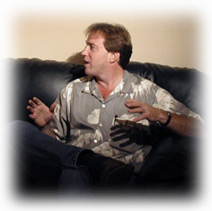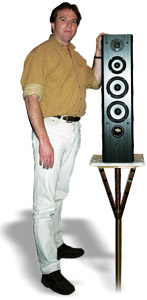Interview with Ian Colquhoun of Axiom Audio

Ian Colquhoun of Axiom Audio
talks about his loudspeaker designs
|
Srajan Ebaen: How did Axiom get its start?
Ian Colquhoun: I started Axiom in a
neighbor's garage 21 years ago -- it was a small beginning. Currently our sales every two
minutes equal those of my first year in business. Times have changed since then, but the
goal from the start was to build a world-class loudspeaker manufacturing company. In order
to accomplish this, [we realized that] high product performance, quality and value were
the key ingredients. Today, our state-of-the-art, vertically-integrated manufacturing
facilities ensure high quality and high value in all of our products. All Axiom product
designs are based around the psycho-acoustic research done at the National Research
Council in Ottawa. Axiom was a key player in this research throughout the 1980s and
beyond, helping to formulate a new worldwide standard for loudspeaker design. Applying
this research has resulted in many award-winning products over the last two decades.
SE: As you know, both Doug Schneider of SoundStage!
and I were very impressed with the performance of your $275 M3Ti model. How can you offer
this much value for so little?
IC: The basic design parameters used for
the M3Ti (and every model in the Axiom line of products) are based around [our] research
at the National Research Council beginning in 1981. The core of this research formulated a
scientific method of objectively determining a loudspeaker's performance in what had,
until then, been a highly subjective arena. We began lengthy comparisons between the
controlled listening room results and the laboratory results of a loudspeaker's
performance and determined exactly which laboratory measurements directly reflected the
performance of the loudspeakers in anyone's living environment. {Anyone interested in
the details on these measurements should read the interview with Kevin Voecks of
Revel Loudspeakers.} Axiom has continued to utilize these design principles to
consistently refine loudspeaker design in search of the ultimate reproduction in a
real-world environment.
The current Millennia series of product is the culmination
of all that research to date. Value for Axiom comes from two separate avenues. One is the
design criteria explained above. Not only do they lead you to better and better sounding
products, but they also prevent you from spending money on design aspects that do not
result in any sonic benefits whatsoever. Secondly, Axiom's manufacturing facilities have
advanced through the years to become a highly automated and extremely precise operation.
SE: What advice would you give someone shopping
for speaker today?
IC: The interesting thing is that there is
no direct correlation between performance and cost for loudspeakers. Some of the
best-sounding speakers on the market may appear to be very simple in design. Another
problem when purchasing loudspeakers is that their actual performance is extremely
difficult to determine in a fast demonstration, especially with pre-selected material.
Great loudspeakers only show their true colors after much listening to various musical
performances.
SE: In the budget sector in particular, what
should loudspeaker shoppers watch out for?

Ian with the M60Ti loudspeaker
|
IC: If it seems like you're getting too
many components or too big a cabinet for your money, you probably are. Virtually all good
budget speakers will be simple two-way midsize designs. Extremely small speakers, if
properly designed, will actually not cost much less than a midsize bookshelf design, but
they will definitely require a subwoofer. The other concern with well-engineered micro
speakers is their much lower efficiency compared to similarly priced brethren in the
midsize bookshelf category. This forces your overall expense upwards because you will need
to purchase more amplifier power (in order to get more performance) and, of course, add a
subwoofer.
SE: Do you recommend any Axiom model in
particular if a customer wanted the best dual-purpose music/movie speaker?
IC: Without a doubt, the M80Ti! This
speaker has great dynamics, high efficiency, low bass, very high power handling and the
same natural response and great imaging as the rest of the Axiom Millennia line. I
actually run the M80Tis in my own home. All things considered, I think of them as the best
loudspeaker I've designed to date.
SE: Do you have any favorite budget electronics
that you find to offer the same level of performance and value as your speakers?
IC: This is a tough question. What I will
say is that for years now, electronics manufacturers have been putting more and more value
into their products. In the final analysis, I certainly agree with Doug Schneider's
assessment that properly chosen, "speakers give you the most bang for the buck."
SE: What new things are on the horizon for
Axiom?
IC: Our experiments in
online-distribution-only for the United States and our international markets have been
enormously successful, so we intend to continue in this vein. As far as products and
engineering in the near term are concerned, we are working on some in-wall and outdoor
speakers. In the longer term, we are involved with some extremely interesting technology
that we should cover in another interview a few years from now. Our eyes are very much
focused on the horizon.